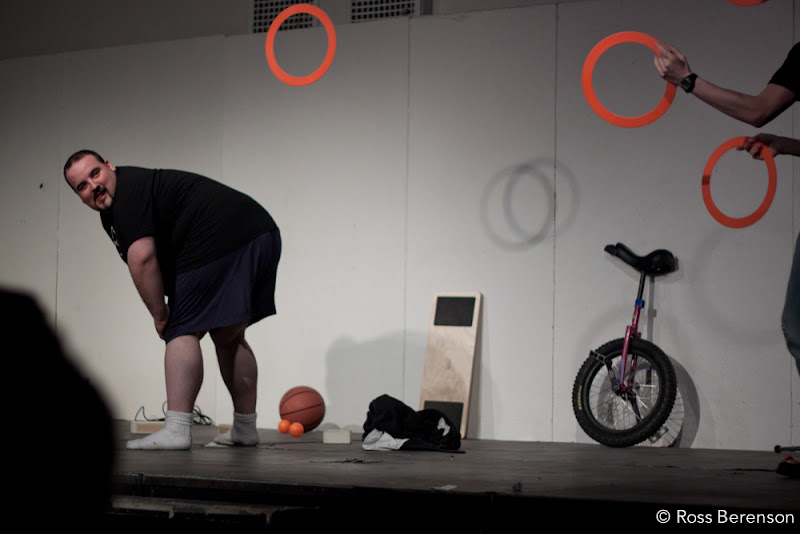Co-host Perry Romanowski and Reese discuss the recent news in joggling, juggling robots, Jay and Wes’s “43 tricks” routine, Joe Showers’s “How i Met My PX3’s”, specific questions about tricks and what is being focused on during joggling, and the Flatland Juggling Festival on their Jugglers on Juggling podcast. Catch more JoJ episodes, the only juggling podcast, on Reese’s website: www.reeses2150.com/joj

Yannick in Cote d'Ivoire
In February, Dubé Juggling Blog featured an interview with Yannick Foe, a Cameroon-born juggler based in the volatile West African nation of Cote d’Ivoire. When we talked to Yannick in February, Cote d’Ivoire was still reeling from November’s hotly contested presidential election. Although the international community recognized that former Prime Minister Alassane Ouattara had won the election, incumbent President Laurent Gbagbo refused to admit defeat, prompting months of bitter sectarian and political violence.
We remained in contact with Yannick throughout the conflict. Despite the intense violence, Yannick continued to juggle every day. In March, around the height of the violence, Yannick wrote the following:
Currently the country’s situation is very serious and many citizens are leaving the country. I would like to leave too, but I don’t know how.
I am well and family back home are okay, but I have a real fear that drives me now and I’m worried about the situation of the country and our future here. It is difficult to live with these killings.
Each day the situation continues to get worse and according to rumors, there will soon clash of the two governments and it’s very scary.

In April, President Gbagbo was captured by the forces of Mr. Ouattara, the internationally recognized winner of November’s election. Although violence still continues, it appears the worst is over. As a new regime takes power in Cote d’Ivoire, there is hope for stability and a return to normalcy. In response, Yannick wrote the following on his Facebook page:
Hello my fellow jugglers,
I pray to God to grant me life after what I saw before my eyes in the post election crisis that took place in Cote d’Ivoire. I thought I would lose my life, because there is a shortage of hope, but I am still here thanks to God.
Our thoughts go out to Yannick, his family, and all those effected by violence and political instability throughout the world.

Baseball is “America’s pastime”. Soccer is known as the “beautiful sport”. Boxing is “the sweet science”. Unicycle football? Well, unicycle football is pretty much THE MOST AWESOME THING EVER.
Founded in 1998, the San Marcos, Texas-based Unicycle Football League is sweeping… the Greater Austin Metropolitan Area. Unicycle football is similar to American football, with the obvious exception that all the players are on unicycles. The UFL consists of six teams: The Berzerkers, the Gnarwhals, the Hot Dogs, the Unicychos, the Ill Eagles and Hell on Wheel. The league features a number of local sponsors, a detailed rule book, and a annual championship game known as The Stupor Bowl. Below, you can watch the local news broadcast coverage of the league.

The term “juggling” gets “thrown” around a lot (no pun intended). A simple Google search of the word nets results ranging from the world of politics (Obama’s juggling act in the Middle East), sports (The Yankees are juggling their lineup) and romance (Juggling family, work and love). As a concept, juggling has essentially been reduced to an ill-fitting metaphor describing someone who multi tasks.
The concept of juggling has been so overused as a metaphor this day in age that it has basically been rendered meaningless. Recently, a friend told me that he was juggling two different women. I told him that he wasn’t actually juggling, as you need at least three for it to qualify. He told me to lighten up, it’s just an expression. We’re no longer friends.
Enough is enough. We as jugglers must stand up and speak with a common voice: No to inappropriate juggling metaphors. They dilute us as a people, denigrate our art form and threaten the fiber of our very existence.

Unicyclists: The Enemy With
Last week, Comedy Central’s The Colbert Report went in depth, exposing the hidden dangers of unicyclists. The segment revealed some startling facts about the one-wheeled menace:
-A 180-pound unicyclist moving at 10 miles per hour can cause more damage than a linebacker in the NFL.
-Unicycles are capable of creating a “domino effect” of pedestrians, leading to mass casualties.
-These one-wheeled death traps ARE coming to run over your babies.
-The law is powerless to stop them.
Below, you can watch the segment. Because of graphic unicycle-on-pedestrian violence, viewer discretion is advised.
We all know that Justin Bieber can (sort of) juggle and that Donald Rumsfeld used to ride a unicycle, but it’s been a while since a bonafide celebrity came forward with some serious circus skills. Enter Ellen Page. Yes, the Canadian-born Juno star has some pretty decent chops it seems, and isn’t afraid to show them off!
The latest new trick by Richard “Reeses” Kohut (creator of the Muffin Clutch).

I sure hope this works...

BULLSEYE!!!

Triumph!
It’s happened to all of us. If you’re reading this blog, then at one point, someone has called you a clown. Maybe it’s because of your habit of juggling during your lunch break. Maybe it’s because you ride your unicycle to work. Maybe it’s because your ringtone is “Entry of the Gladiators”. Someone has called you a clown, maybe even today.
Many accept it with a shrug. Others take it as a compliment. Some of us take serious offense. Alex on Facebook writes:
I’m terrified of clowns and therefore juggle in a tux. I cringe when people say I should go to the circus…
New York Juggler Paris (no last name), had the following to say:
As a juggler I respect clowns. We just want to be recognized for all our hard work. Police officers and firefighters have mutual respect but I imagine that a cop would be annoyed if you confuse him with a firefighter.
Keith Nelson, however, has a different perspective. Keith works as a clown and a juggler (among many other things), and was kind enough to share his point of view:
Just because someone can juggle does not mean they are a clown. Clowning takes years of pain and suffering in order to understand the inner workings of human nature, where as a juggler simply has to throw stuff in the air for fun, pleasure, and possibly a living.
Juggling takes practice, clowning takes living and suffering.
We want your opinion on the issue. Leave a comment below!
By TMJ Gossip Staff
Juggling magnate and high-profile man about town Brian Dubé was spotted with Jersey Shore starlet Nicole “Snooki” Polizzi at Jay Z’s 40/40 Club in Chelsea. Witnesses say the pair got a little bit frisky on the dance floor, enjoying Long Island Iced Teas and fist pumping the night away. When approached about the alleged encounter, Brian was not coy.
“She’s a wonderful girl,” the juggling kingpin said. “We’ve got a lot in common and she has a lot of interesting things to say.”
A spokesperson for Polizzi declined comment. The news of their relationship comes just weeks after fellow juggling prop maker Todd Smith was sighted attending a high-profile gala at Los Angeles’ Viper Room with Jenni “JWoww” Farley.
As children, many of us dream of being in the circus. That dream, however, can quickly become a nightmare. Many child circus performers in the third world are trafficked, abused and neglected. They aren’t willing participants in the circus show, but rather forced by unscrupulous circus owners in search of a fast buck.
Luckily, people are working to put a stop to this disturbing practice. The Esther Benjamins Trust is an organization devoted to rescuing exploited Nepalese child performers. The group works with local law enforcement to shut down circuses using illegal child labor. They also provide traditional schooling and professional circus training to the rescued performers, helping them develop the skills necessary to support themselves as they grow older.
Joaquín López, a Mexican-born clown and juggler, learned his craft the hard way. After making a living performing on the streets of Mexico City, Joaquín began travelling throughout Latin American, eventually settling in New York City. Although he enjoyed life in New York, Joaquín knew he had a higher calling. He soon left the cosmopolitan comfort of the big city to work with the child circus refugees of Nepal. Joaquín was kind enough to spend some time with us talking about his experiences.
Tell us about the children you’re working with. How did they get to your organization?
Some of the children that I worked with were victims of human trafficking. “Agents” convinced them to travel to India to get jobs in Indian circuses but most of the times they lived in very bad conditions. In some cases the families ask the organization for help to rescue this kids. After we rescue them, if the family doesn’t have the resources to take care of them, the organization provides a place to live, schooling, food and sometimes even a job. Others kids are street kids or victims of violence, even some of them were in prison in Nepal.
What is life like for the average child circus performer in South Asia?
I don’t have the answer to this question. What I do know is that in some Indian circuses they use child labor and not in a creative or artistic way. They teach the kids the skills in a mechanic way repetition and repetition, like robots. That is the reason that Esther Benjamins Trust created a circus company named “Sapana” to try to give the kids a new opportunity with the circus but this time in an artistic and creative way.
How is Nepal? Is it very different from the other places you’ve lived (Mexico City, NYC, Guatemala, Honduras, etc)
Is really different from other parts of the world that I’ve lived. The first difference and the biggest for me was the religion because it is everywhere in public life. The principal religion there is Hinduism and the second is Buddhism; many cultural traditions are mixed with these two religions. The most wonderful thing is that people practice both religions in peace.
What do you hope to achieve with these young people?
I hope that this new experience with the circus helps them in two different ways: help them to get a job so they become self sufficient and in the other hand, to take the negative experiences these children had in the circus and turn them into positive ones.
How do you think this experience has changed you as a performer and as a teacher?
Well, as a performer always is good to try different audiences. Some things that work for you with some people don’t work with others. So the experience was excellent to practice my improvisational skills.Because the people there speak Nepali I am required to communicate by unconventional methods. As a teacher, usually I am a social circus instructor so, the visit was perfect to increase my experience, to realize again that social circus is about more sharing and learning than teaching. Also the experience with these kids was awesome because they are very good kids with a very big heart. This was my big learning experience there, how to have the big heart that they have.
Click below to see a mini documentary on the Esther Benjamins Trust, including stunning images of a rescue operation and touching footage of rescued performers in action:
Telapayaso report. Nopal in Nepal from Kolectivo Que Da Alegría on Vimeo.











